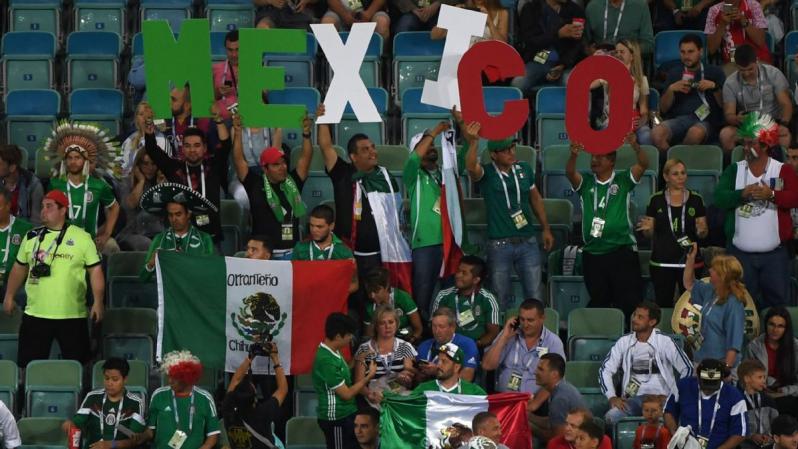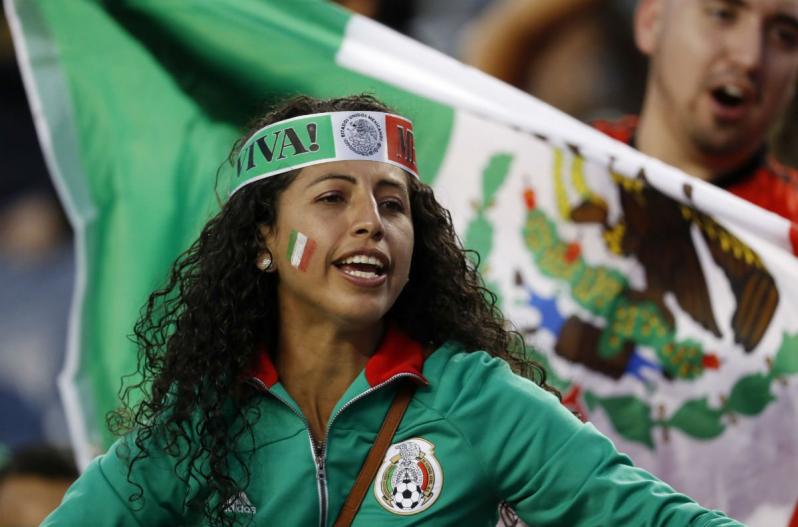As Jamaican Kemar Lawrence’s sweetly-struck free kick sailed into the back of the net in the semifinals of the Gold Cup on Sunday night, millions of soccer fans across America reacted viscerally. Some cheered for the wonderful goal. Some laughed as Mexico was knocked out of the Gold Cup. Some groaned over the loss of a Mexico-U.S. final. And many more shouted out in distress as their favorite soccer team suffered an ignominious defeat.
It can be a struggle, being a soccer fan. The ups and downs, the euphoric victories and soul-crushing defeats, the friendly trash talk and seething rivalries. Now imagine being a fan of a nation that is derided by the president of the country in which you live, where simply wearing your team’s jersey can spark outbursts of anger or resentment.
For millions living in America, rooting for the Mexican national team is an important part of their lives — it represents where they come from and who they are.
“I root exclusively for Mexico; it’s not even an issue I struggle with,” said Victor Texcucano, a Dallas resident who was born in Mexico. “My family is the same way, even most cousins and other relatives that might have been born in the U.S. Our ties to Mexico are very strong.
“I will root for Michael Phelps or Gabby Douglas or other American athletes, but I unapologetically will never root for American soccer.”
Equal parts minority and majority, marginalized and mainstream, superiority with an inferiority complex, Mexico soccer fans living in America have unique place in the sports world.
Growing Base
In the 2010 census, 10.3 percent of Americans identified as Mexican, a number growing rapidly. As more Mexicans move to the U.S. — and those here grow in population themselves — the number of Mexican soccer fans follows suit.
For many, like Texcucano, it starts at an early age.
“Ever since I knew and understood that I was to root for the team in green, I knew I was supposed to hate the team in red, white and blue,” said Texcucano, 28.
Mexican-Americans often dominate the soccer landscape in America.
It’s no secret fans of Mexico show out in force more than Americans, even in Gold Cups held in the U.S. If the USMNT and Mexico play in a large stadium anywhere in the southern half of the U.S., the green will far outnumber the red, white and blue.
Raúl Antonio Ramírez has seen the U.S. and Mexico square off both in Mexico City and in Denver, where he currently resides.
“Both games felt like a home game for Mexico,” Ramírez said.
Americans do have one attendance figure outranking Mexico. At the 2014 World Cup in Brazil, only Brazilians bought more tickets than Americans. That said, it’s difficult to tell how of those Americans who bought tickets were fans of Mexico.
Mexican-Americans watch more from home as well. Liga MX is the most-watched league in the U.S., followed by the English Premier League then Major League Soccer. Telemundo and Univision regularly draw more viewers for big international matches than ESPN or FS1.
Take this summer’s Confederations Cup for example. In the final, featuring Chile against Germany, Telemundo’s broadcast had 2.2 million viewers compared to 800,000 for FS1.
When Mexico is involved, the numbers are similar. Mexico’s Confederations Cup semifinal match against Germany saw 2.2 million tune in on Telemundo while FS1 drew 262,000.
In the Gold Cup quarterfinals, Mexico-Honduras drew 3.5 million on Universion and 339,000 on FS1. The USA-El Salvador match drew 1.7 million on UniMas and 1.1 million on FS1.
CONCACAF corrects me: Photos are allowed this year. So here's the halftime crowd for Mexico-Jamaica. Smallest I've seen for El Tri in LA. pic.twitter.com/A3MpEXHlo9
— Greg Beacham (@gregbeacham) July 24, 2017
The choice of which channel to watch — English or Spanish — varies among fans.
If he’s watching alone, Jorge Alvarado, 28, watches the Mexican national team in English. However, he’s often watching with his family, which means he’ll watch in Spanish for his mom.
“I feel like the English version is kind of less biased than watching the Spanish channels,” said Alvarado, a Denver resident who was born in Mexico. “I think there’s more emotion that comes out of Spanish commentators.”
Ramírez and Texcucano said they watch in Spanish because of the enthusiasm and passion of the Spanish-language broadcasters.
“Spanish-language commentating has more of a passion, which makes it more enjoyable,” Texcucano said. “Some English broadcasts include broadcasters that are Mexican and even possibly ex-Spanish-language broadcasters, and they sound completely terrible in English. That same passion does not translate, apparently.”
Denver-area DJ Sam Zinn, 38, also watches in Spanish, comparing the passion of the Spanish-language announcers to watching American football in English.
“I love American football a lot and I’m very passionate about it,” Zinn said. “When I watch a Mexican broadcast of a football game then I see that same passion with American football.”
Football Philosophy
Zinn is not your typical Mexico supporter.
Born and raised in the Colorado mountains, Zinn did not grow up on soccer. The son of an American mother and a Mexican father, Zinn rejected his Mexican heritage until his dad became a larger part of his life.
“He took it upon himself to teach me more about the culture,” Zinn said. “It’s something that has been learned for me starting at about age 7. It’s been very important to him to help me understand that half of my heritage.”
That heritage did not immediately make Zinn a soccer fan. Not until a trip to Europe where he was in Germany when the Germans won the 1996 Euros with future U.S. coach Jurgen Klinsmann on the squad did Zinn begin to appreciate soccer.

Now Zinn watches Mexico whenever the team is in a big competition like Copa America or World Cup.
His fandom differs from many, who vigorously follow every match, from friendlies to World Cups. Ramírez will call the match up on his phone if he’s at work. Texcucano recently took a personal day to watch Mexico play New Zealand in the Confederations Cup.
Many Americans are similar in their zeal for the USMNT, however it’s not the same, Zinn says. Despite being half American, Zinn rarely pays attention to the U.S. men’s national team. When Jurgen Klinsmann was hired as manager, he became marginally interested because of his experience in Germany, but that was it.
Because the U.S. focuses more on American football, basketball and baseball, American soccer doesn’t interest Zinn.
“I don’t think that I take U.S. soccer particularly seriously,” he said. “It doesn’t mean as much to the American team. That’s just another sport to dominate . . . It’s not that Americans are inherently passionate about soccer, they’re just passionate about being the best at whatever.
“It’s not that I’m anti-American, it’s just that I just don’t feel that America is genuine about its love for soccer.”
Chris Parry would disagree.
“I bleed red, white and blue when it comes to U.S. national team soccer,” said Parry, of Texas.
Culture Clash
Parry, who’s lived in the Middle East (Saudi Arabia), Northeast (Massachusetts) and Southeast (Texas), is just as passionate about Team USA as any Mexican fan is for El Tri and takes his soccer seriously. He’s among a still-growing population in America that has helped fuel the intense rivalry between the U.S. and Mexico, which has grown exponentially since the 1990s when Team USA reemerged as a player on the world stage.
Soccer is important to both cultures, though perhaps more so south of the border. Liga MX averaged 27,167 fans last season, putting it close to third next to La Liga and behind the Bundesliga and English Premier League among the top attended leagues. Major League Soccer averaged 21,692 fans last year, seventh best in the world.
When two fiercely devoted rival fan bases live in the same country, there will be clashes — some friendly, others not so much.
“I have some U.S. fans that are close friends of mine,” Alvarado said. “We’re always debating on who the better side is. They always bring up the World Cup when they beat us 2-0.
“But sometimes when you are maybe watching a game at a bar or whether it be in a more U.S.-friendly place, you kind of shy away from really cheering as hard or celebrating as much as you would normally. You kind of just tame it down a little more.”

Alvarado and Zinn said they have been on the receiving end of negativity while rooting for the Mexican national team.
Zinn said he’s had U.S. fans yell in his face and he’s been called things like a communist, though nothing ever got too personal.
“When you go against rooting for America in anyway there generally is some backlash,” Zinn said. “While people are not necessarily overtly aggressive about it, there is an undertone of you being a traitor to your country.”
One of the most exhilarating experiences for a sports fan is to take in a game at a rival’s home venue, be it visiting the Camp Nou as a Real Madrid fan or Bryant Denny as an Auburn graduate.
It’s a little different when you’re living in the country you root against. Should soccer fans feel obligated to root for the country in which they live and make a living? Parry says yes.
“I can understand if you’re working in the U.S. and are a Mexican citizen, but the majority of people in stadiums rooting against the U.S. chose to become an American,” Parry said. “Why would you root against your own country?”
Parry compares it to someone going to school at Texas A&M before transferring to the University of Texas at Austin and rooting for the Aggies at football games as a UT student.
“It is beyond ridiculous, but our country was so worried about the lack of attendance 20 years ago that they've allowed opposing fans — who are Americans for goodness sake — to take over venues and make them away games for the USMNT.
“There should be a limit on the number of tickets opposing fans are allowed to buy for USA games.”
Of course, not all fans of Mexico living in the U.S. are U.S. citizens, like Alvarado and Texcucano, the latter of which grew up in the shadow of the Azteca in Mexico City. Not that citizenship makes them feel any more or less American.
“It’s a personal decision that comes from your heart and your gut; logic has little to do with it,” Texcucano said of rooting for El Tri. “I love the U.S. in a lot of ways and I don't believe me rooting against their soccer team makes me some kind of traitor.”
Alvarado was born in Mexico but moved to America before he was a year old. He said he considers himself more American than Mexican.
That said, he’d be sick if the U.S. ever won the World Cup before Mexico.
“Growing up here makes me more Americanized,” Alvarado said. “My roots are more Mexican based, value wise, and just the way you’re brought up, food wise, culture wise.”
So when Alvarado feels discriminated against for rooting for the country of his birth while in the country of his upbringing, he takes it personally. It’s not just a rival club like choosing between Manchester United and Manchester City; it’s about who you are and where you come from. Or, to compare it to Parry’s analogy, where one goes to college is a choice — where one’s family and culture come from is inherited.
“I take it more personally than I should just because it’s more national-team oriented than just a regular American football team,” Alvarado said. “But when it comes to a national football team, you get attached more as a nationalist instead of just being a fan. You get attacked more towards your culture than it really is towards a team.”

Zinn also takes it personally, but comes from another direction.
Living under a president who insulted Mexicans as one of his primary campaign platforms, Zinn roots for Mexico almost as an act of defiance.
“Being a Mexican-American in the United States, I feel like we live in a time where it’s still acceptable to bag on Mexicans, where Mexicans are often viewed and talked about as a nuisances, so it does take on a personal thing,” Zinn said. “I think as somebody who is part Mexican, I find myself rooting for Mexico partially almost out of retaliation for how I feel Mexican-Americans are treated in this country.”
It makes for a complicated relationship, Zinn said. It almost always is for minorities, whether in the U.S. or elsewhere. Being a fan of El Tri in the U.S. is a unifying bond for the growing population of Mexican-Americans. The tens of millions of Mexicans living in the U.S. aren’t going to change who they are or where they come from just because they support a different football team than the rest of the country.
“Being Mexican in the United States means your ancestors have been here for quite a long time,” Zinn said. “To ask someone to just root for the United States because all of a sudden that’s your nationality, I find it kind of concerning.
“It’s almost as if you’re being asked to forget where you come from.”
And that is not an option for any fan.




